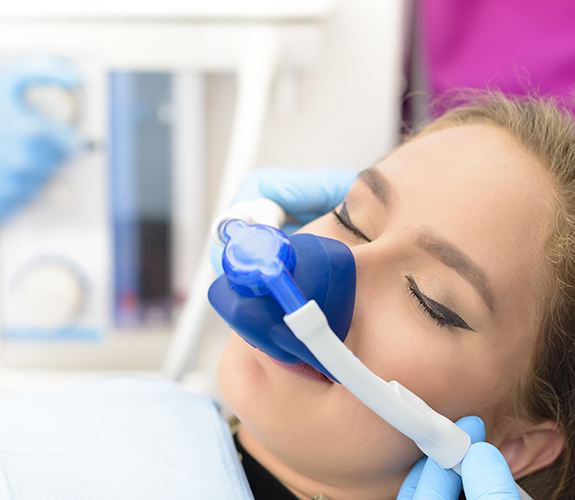
Sedation Dentistry – Wilmington, IL
Helping You Feel At-Ease In Our Dental Office
Patients of any age can feel anxious about visiting the dentist for a variety of reasons, including prior bad experiences or the fear of receiving bad news. We understand that this makes it hard to call us and schedule necessary treatments and routine appointments. That is why we offer sedation dentistry. We’ll work with you to determine which of our three different options for sedation dentistry in Wilmington, IL will be best for your needs. That way, you can feel more comfortable and relaxed while completing necessary dental treatments.

Why Choose Grand Dental - Wilmington for Sedation Dentistry?
- Dental Sedation For Kids
- Easing Mild to Severe Anxiety
- Friendly & Empathetic Staff
Nitrous Oxide Dental Sedation

Nitrous oxide sedation is administered when you sit down in the treatment room. We’ll place a small nose mask on your face, which will allow you to breathe in the colorless, odorless nitrous oxide gas, frequently called “laughing gas”. Within a few minutes, you’ll begin to feel the effects wash over you, causing you to feel a wave of euphoria. After the procedure, the effects of nitrous oxide will wear off soon after the mask is removed, allowing you to go about your day as normal.
Oral Conscious Sedation

Oral conscious sedation is a great option for patients who experience moderate to severe anxiety at the thought of visiting the dentist. About an hour before your appointment, you’ll take prescribed oral medication. When you arrive at our dental office, you’ll feel relaxed and at ease, allowing us to begin the treatment. Because the effects will linger both before and after your visit, you’ll need to have a trusted friend or family member drive you to and from our dental office.
What is Oral Conscious Sedation?

Oral sedation in Wilmington is a form of treatment that is used to help patients relax while receiving minor or complex dental services. Many different forms of medication can be used, including Valium, Ativan, or Halcion.
Patients are expected to take the medication before arriving at the dentist’s office so that there is plenty of time for it to kick in and take effect.
This method of sedation is much easier for many patients because it doesn’t require a mask or needle, which is a welcome reality for those who are fearful of IVs.
How Does Oral Conscious Sedation Work?

When receiving oral conscious sedation, a patient will enter a state of deep relaxation but not become unconscious. Although an individual can doze off during treatment, they can be easily awoken by dental staff members if necessary.
After treatment is complete, the effects of the sedation will not wear off immediately, so a family member or friend must escort the patient home. It is recommended that those who receive oral conscious sedation plan to rest the remainder of the day.
Are You a Good Candidate for Oral Conscious Sedation?

Those who are interested in oral conscious sedation for an upcoming appointment will first need to undergo a consultation with a member of our Grand Dental – Wilmington team. After determining the status of one’s overall health and whether existing medications might interfere with sedation, our team will either suggest an alternative solution or provide clearance to receive oral conscious sedation.
Some of the more common reasons a person might be considered a good candidate for this type of sedation include:
- They suffer from moderate to severe dental anxiety
- They have a strong or sensitive gag reflex
- They are planning to have more than one dental treatment performed in a single appointment
- They struggle with local anesthesia
- They experience difficulty sitting still for prolonged periods in the treatment chair
IV Sedation

IV sedation is a stronger option for individuals who need help to stay calm and receive necessary dental care to improve their oral health. Administered directly into the bloodstream, its effects produce feelings of relaxation, making it a safe and highly effective way to create a positive and comfortable experience for patients.
What is IV Sedation?

Unlike nitrous oxide, which is inhaled, and oral conscious sedation, which is taken as a pill, IV sedation is a liquid solution that is administered intravenously into a patient’s bloodstream. The medication that is used allows those who struggle to visit the dentist for essential treatment to undergo multiple or complex dental procedures without fear or anxiety.
Who is a Good Candidate for IV Sedation?

Determining whether a person is a good candidate for IV sedation requires a scheduled appointment with one of our Grand Dental – Wilmington dentists. Through careful evaluation and questions and answers, we will decide if this method of sedation will be safe and effective.
In most cases, those who struggle with the following may qualify:
- Those who have a sensitive or strong gag reflex
- Those who will receive multiple dental treatments in a single appointment
- Those who struggle with other forms of sedation
- Those who are fearful of the dentist’s office because of past trauma
It is necessary to discuss current medications during this initial visit, as our doctors must make sure that it is safe to administer. We do not want negative interactions to occur, so the patient must be honest and open with our IV sedation dentist when going over their medical history.
The Benefits of IV Sedation

Receiving IV sedation for an upcoming dental appointment and/or procedure offers many great benefits, including:
- A fast-acting form of sedation that produces a calming effect in minutes
- Medication that may cause some patients to doze off during their appointment, but not be fully sedated
- A solution that produces temporary amnesia so that individuals will be unlikely to remember anything from their appointment
- Careful administration and close monitoring by skilled professionals who can adjust the dosage throughout treatment
- The ability for an individual to receive vital dental care to take better care of their oral health
Sedation Dentistry FAQs
Is sedation dentistry safe while pregnant?
There has been much discussion regarding the safety of pregnant women and dental sedation; however, the consensus is that there is a possibility that the medications used could enter the placenta and pass to the fetus. This is why it’s best to avoid it while pregnant if possible. Not only could receiving sedation during the first trimester lead to developmental issues, but if administered during the third trimester, it could result in pre-term labor.
Generally, if sedation is to be used, it’s best (and safest) during the second trimester. However, if you require invasive treatment, you’ll likely need to wait until after your baby is born.
Will I remember anything with dental sedation?
Most forms of sedation will not put you to sleep. Instead, you’ll enter a more relaxed state – one that allows you to doze off but still be aware enough to respond to any dental cues. After your treatment is complete, though, you’ll be unlikely to remember anything from your appointment. This temporary amnesia can be a helpful side effect for anyone who might feel anxious about the dentist’s office and what occurs during the visit.
Will I feel any pain with dental sedation?
This is a common concern for many individuals, but the good news is that the body works to suppress any pain during treatment. Once the gas is inhaled or medication is administered, you will remain awake but unfazed by the work being done inside your mouth. You’ll feel no discomfort, but you might feel some slight pressure, although not enough to cause worry or concern. Depending on the type of procedure you require, you might also receive local anesthesia to numb areas of your mouth, allowing for another level of pain protection.
Can dental sedation make you sick?
Each type of sedation produces different side effects. When it comes to nitrous oxide, it’s unlikely you will experience any nausea afterward. With oral conscious sedation, it’s possible to feel uneasy after your appointment, which is why you can expect your sedation dentist in Wilmington to discourage eating in the hours leading to your procedure.
If you are preparing for IV sedation, there is a higher risk of experiencing nausea after treatment. If you are concerned about potentially getting sick after receiving any form of sedation, don’t hesitate to talk to your dentist about it.